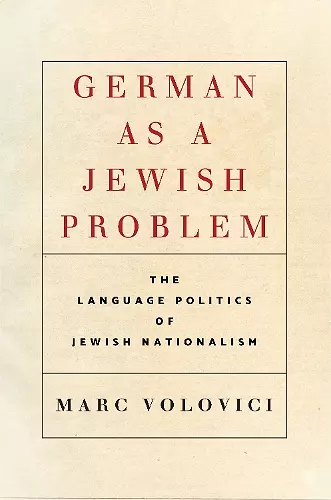German as a Jewish Problem
The Language Politics of Jewish Nationalism
Format:Hardback
Publisher:Stanford University Press
Published:14th Jul '20
Should be back in stock very soon

The German language holds an ambivalent and controversial place in the modern history of European Jews, representing different—often conflicting—historical currents. It was the language of the German classics, of German Jewish writers and scientists, of Central European Jewish culture, and of Herzl and the Zionist movement. But it was also the language of Hitler, Goebbels, and the German guards in Nazi concentration camps. The crucial role of German in the formation of Jewish national culture and politics in the late nineteenth century has been largely overshadowed by the catastrophic events that befell Jews under Nazi rule.
German as a Jewish Problem tells the Jewish history of the German language, focusing on Jewish national movements in Central and Eastern Europe and Palestine/Israel. Marc Volovici considers key writers and activists whose work reflected the multilingual nature of the Jewish national sphere and the centrality of the German language within it, and argues that it is impossible to understand the histories of modern Hebrew and Yiddish without situating them in relation to German. This book offers a new understanding of the language problem in modern Jewish history, turning to German to illuminate the questions and dilemmas that largely defined the experience of European Jews in the age of nationalism.
"In this sparkling and original account, Marc Volovici unpacks the various meanings of German in modern Jewish history. A language of transcendence as well as tragedy, German transformed Jews in myriad ways and in so doing, blurred the traditional distinction between Jewish and non-Jewish languages. A fascinating, superbly told story."—John M. Efron, University of California, Berkeley
"Training his eye on the omnipresence of German in European Jewish nationalist discourse, Marc Volovici reveals the profound significance of the language not only in the lives of those Jews who spoke it but also in the evolution of a much wider, transnational, multilingual community of Jews who read in German, wrote in German, and shaped their thinking about Jewish modernity and nationalism in, through, and against it. A major contribution to the fields of modern European Jewish history, the history of Zionism, and the study of national language politics in modern times."—Liora R. Halperin, University of Washington
"Volovici's insightful and elegantly crafted study makes an important contribution to our understanding of Jewish language politics in general and Jewish nationalism's ambivalent relationship with German in particular."—Kalman Weiser, Journal of Jewish Languages
"It is notable for a piece of historical, rather than linguistic, scholarship to take a language as its central object of study. Volovici does so elegantly, tracing the shifting symbolic and functional role of the German language in the development of Jewish nationalism over the past two centuries."—Lea Greenberg, In geveb
"Crucially, in this fascinating book, Volovici captures more broadly how Jews' attitude to German—in the language and against it—came to crystallize the various tensions within
modern European Jewry as it struggled to articulate and assert itself."—Audrey Borowski, Times Literary Supplement
"A short review can hardly encompass the breadth of Volovici's undertaking... The book is a fine example of cultural/intellectual history, which is useful not only to students of Jewish history, but also to scholars of German and European history, and those who study antisemitism, nationalism, and group identity."—Gil Ribak, Journal of Contemporary Antisemitism
"Volovici provides a complex picture of the language of Heine and Hitler, of Goethe and Goebbels. German was not always a Jewish problem, but it was a language without which modern Jewish history, in its best and in its worst times, cannot be imagined. Thus, this book provides important keys of understanding both to modern Jewish history and to modern German culture."—Michael Brenner, Association for Jewish Studies Review
"The tenacious hold of the German language on modern Jews and its consequences for politics, religion, and self-definition are the subject of this original and well-researched volume. The purview of its young author, Marc Volovici, is broad and his questions penetrating."—Michael A. Meyer, Journal of Modern History
"German as a Jewish Problem offers a captivating exploration of the varied roles the German language has played in Jewish life, from the onset of Jewish Enlightenment in Europe to the post-World War II era in the Middle East. The book adeptly achieves this objective by illustrating how German influenced key ideas and social dynamics within Jewish nationalism, guiding readers through historical debates and revealing the complex interplay of contradictory opinions that shaped these discussions."—Gilad Shiram, Journal of Modern Jewish Studies
ISBN: 9781503612303
Dimensions: unknown
Weight: unknown
352 pages